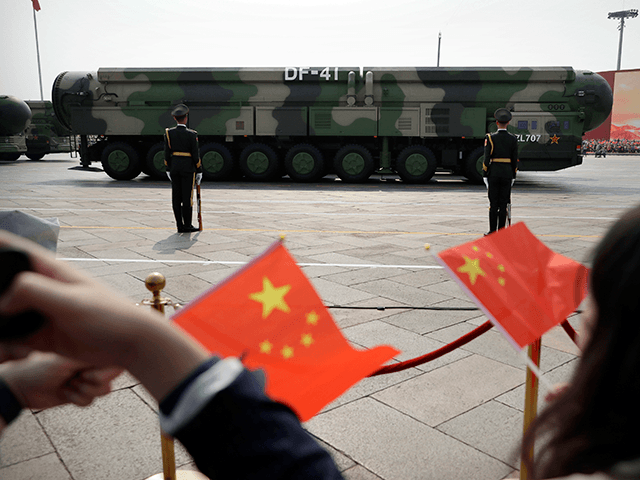Americans view various types of nuclear weapons, terrorism, and China as “critical threats” to the United States, according to a Gallup poll released on Monday.
According to a survey of 1,008 adults between February 1-17, 82 percent of Americans believe cyberterrorism is a “critical threat.” Seventy-one percent say the same about international terrorism, and 68 percent concerning domestic terrorism. The margin of sampling error is ±4 percentage points at the 95 percent confidence level.
Three out of four Americans also “believe Iran’s and North Korea’s development of nuclear weapons is a serious threat to the U.S.” Americans also view Chinese military power (67 percent) and China’s economy (57 percent) as threats to the nation.
Concern about China’s economy and military have increased in the past few years.
“The 67 percent who currently view China’s military power as a critical threat is the highest in Gallup’s trend, 16 percentage points above the prior high from 2013 and 26 points higher than the previous measure, in 2016,” the survey found.
Gallup first asked respondents about their views of China’s economy in 2013. At that point, and in 2014, 52 percent of Americans said China was a critical threat. During Donald Trump’s presidency, between 2015 and 2019, Americans’ opinions of the threat posed by China’s economy eased to between 40 percent and 46 percent — “perhaps because Americans were more positive about the U.S. economy,” Gallup speculated.
“However, last year the percentage viewing China’s economy as a critical threat surged to 63 percent, before falling slightly this year, to 57 percent,” according to the report.
The survey report said that increases in the perceived threat of China coincide with results from another recent poll which found that 49 percent of Americans view China as the U.S.’s “greatest enemy,” up from 45 percent last year.
Gallup noted that the survey was conducted before Russia invaded Ukraine. However, U.S. adults said Russia’s military power (59 percent) and the Russia-Ukraine situation (52 percent) are both critical threats to the United States.
“It is unclear how Russia’s invasion of Ukraine may have changed Americans’ opinions on which country is the top U.S. enemy,” the report states.
According to the poll, concern about cyberterrorism has surpassed concern about international terrorism, though both terrorism and nuclear weapons “have typically been the greatest concerns.” Fewer Americans are worried about the “spread of infectious diseases” being a critical threat to the U.S., 64 percent compared to 72 percent in 2021.
“The percentage saying infectious diseases are a critical threat essentially matches that of the last pre-pandemic measure, in 2016 (63 percent),” Gallup reported.
Americans’ concerns by political affiliation “differ by double-digit margins on about half of the issues measured in the survey.” The largest difference is global warming — 83 percent of Democrats view global warming as a critical threat compared to 19 percent of Republicans. The second-largest gap is on immigration, with 82 percent of Republicans and 25 percent of Democrats viewing it as a major threat.
Democrats are also more likely than GOP voters to view the spread of infectious diseases as a critical threat. In contrast, Republicans are more likely than Democrats to “believe the economic power of China, Iranian nuclear weapons, the military power of China and international terrorism are threats.”

COMMENTS
Please let us know if you're having issues with commenting.